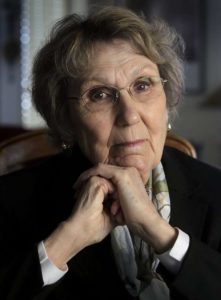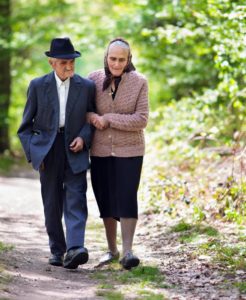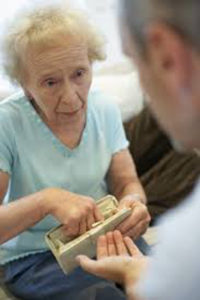In the second portion of this two-part interview, SevenPonds speaks to Helen Karr, a former supervisor of beauty salons who now advocates for the elderly community. At age 65, Karr went back to school to become an attorney after hearing about and witnessing the mistreatment of her elderly customers. Now retired at 83, Helen Karr has worked as the Elder Abuse Special Assistant in the San Francisco District Attorney’s office offering advice to seniors about how to protect themselves against fraud and scams. Helen also was instrumental in having the month of May designated as Elder and Dependent Adult Abuse Awareness Month in California.

Credit: sfgate.com
Kristen: Are elderly women typically targeted more than elderly men?
Helen Karr: At one time, women were more likely to be targeted. But one must take into account that women live longer than men and there are more women living alone than men.
Nevertheless, one of the first cases I ever worked on involved an elderly man who was tricked out of his inheritance from his wife. The man had just lost his wife after caring for her for many years. He often took checks and coins to deposit at the bank and befriended a woman who was a bank teller. He told her his entire story.
The teller then began pretending to be his wife. She transferred all the money in his savings account into her name. She even moved into his home when he was put into an assisted living facility. But no one in the home would believe his story. It took a trip to the hospital for him to inform anyone of what had happened to him. And even then, he was placed on a psychotropic drug and sent home.

Credit: wisegeek.com
Then, two weeks before he died, an ombudsman went to see him, and he told her his story. She believed him and she called the police. That was the first case I worked on.
All states have adult protective services. It is somewhat different from Child Protective Services because an elder can’t be taken out of home. They can also be really isolated and unable to reach anybody unless they have some way to reach the police themselves.
If a child is stealing from their parents, they need help too.
Kristen: Can you talk a little bit about the Victim Services Elder Abuse Senior Volunteer Program?
Helen: I worked with the Victim Service staff at the DA’s office, where we provide assistance to all elder or dependent adult abuse victims over 65 years old by bringing culturally and language-appropriate services directly to those in need. We help elders cope with the trauma of victimization and provide an orientation to the criminal justice system. We also accompany them to court, assist with property return, and provide them with resources, referrals, and extensive information.
I also started a senior volunteer program in San Francisco, where I trained older advocates in the center to see the signs of elder abuse. I also gave them the tools and knowledge to help those who were being abused. Many people don’t want to go as far as talking to agencies, but feel comfortable talking to other seniors. That’s why I did it.
Kristen: Do you know of any national programs that assist the elderly in the same ways that you do?
Helen: No, but I know there is the Elder Care Locator through the U.S. Department of Aging. You can also call (800) 677-1616, which is a hotline that will direct you to the Area Agency on Aging. The National Center for Elder Abuse is also a helpful resource, but no national service has people go out into the community and work the way I did.
Kristen: Can you talk a little bit about the types of financial abuse that you see? Are there any cases that you find particularly common?
Helen: Sure. There are many types of financial abuse, including plain theft. But mainly I see types where someone close to an elder steals money and property from them. In my opinion, elder abuse usually happens within the family, or by a paid caregiver. It rarely involves a stranger.

Credit: aginginvestigator.com
One instance I remember was about a couple who moved into the wife’s mother’s home. Originally the house was in the name of the mother. But the wife came in and put herself down as the owner of the home. Then they kept her mother isolated in one bedroom where she would have to walk outside to go to the bathroom. Eventually they evicted her.
Another example that stuck with me was of a young man who moved in with his grandmother while he attended college. He got mixed up with drugs and began to ask her for money. He wanted her to put his name on her checking account. As the situation worsened, the young man locked his grandmother in her room and sometimes did not feed her. He even threatened her, saying he talked to her doctor and that he would help put her away. By some miracle, the woman was able to walk out of the house one day. She took money, got a cab, and took the cab to the doctor’s office where my friend was a patient. She overheard the woman’s situation and helped her to see the doctor. Then she helped the woman escape from her situation. It truly breaks my heart.
Kristen: Have you seen more seniors targeted/defrauded by phishing scams?
Helen: No, at least not when I worked in the District Attorney’s Office. But I have been out of the business for about a year now, so it could very well be an issue I haven’t witnessed. Either way, I make it my mission to get out there and explain all kinds of elder abuse dangers to anyone who will listen.
Seniors are often targeted because they are usually home during the day and/or live alone. Scammers will call acting like friends of the family and try to get the elders to be their friend. Some even go far enough to tell them one of their children got into an accident, and then ask for money for medical expenses. People are more aware of consumer fraud than elder abuse, but both are equally prevalent.

Credit: seniors.lovetoknow.com
Kristen: How can those who are elderly or are caring for elder persons protect themselves or their loved ones?
Helen: Well, people need to be educated. They need to understand what it is, and know the signs of abuse if or when someone is trying to take advantage of them. They can always call the police, if not other numbers or hotlines for help. I encourage the community to be more aware of and talk about elder abuse. Although many people don’t want to use the word “abuse” when describing their situations, it needs to be used and acknowledged as such.
Kristen: Thank you so much for your helpful insights!
Helen: You’re very welcome.
Did you miss part one of our interview with Helen? I so, you can catch up here.

 How Can We Protect Seniors from Elder Abuse?
How Can We Protect Seniors from Elder Abuse?


 First the Wealth Gap, Now the U.S. Has a Growing Health Gap
First the Wealth Gap, Now the U.S. Has a Growing Health Gap
 “Songbird” by Fleetwood Mac
“Songbird” by Fleetwood Mac















